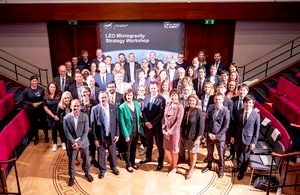NASA comes to London to advance microgravity research

Above: UK Space Agency, NASA and international partners at the LEO Microgravity Strategy Workshop in London.
Courtesy UKSA
NASA worked with the UK Space Agency to co-host the workshop, which builds on the success of two previous events held in 2022 and 2023.
The workshop brings together international partners to refine draft goals and objectives that will set strategic directions for the space community on scientific, exploration and commercial goals in low Earth Orbit (LEO).
A key focus of the workshop surrounds discussion on future low Earth orbit infrastructure. As new commercial space stations come online, there is an increased focus on preserving and expanding research capabilities and developing critical technologies for future deep space exploration.
The UK Space Agency is actively exploring how best to maximise the research, development and manufacturing opportunities this presents, and how to work constructively with international partners to support the transition.
More broadly, microgravity research is not only vital for space exploration, but also delivers benefits to Earth. It allows scientists to study biological, physical and chemical processes without the influence of Earth’s gravity, which has led to advancements in fields such as medicine, material science and fluid dynamics.
One important example is drug development, where protein crystal growth experiments conducted on the ISS have provided improvements to the treatment of numerous diseases including cancers and gum disease. Promising results have come from the study of a protein associated with the chronic genetic disorder Duchenne Muscle Dystrophy (DMD). Treatment for DMD is now in clinical trials – based on research from the ISS.
The study of fluid dynamics in microgravity also helps advance essential medical technologies such as life support systems.
Dr Paul Bate, Chief Executive of the UK Space Agency, said: "We are proud of the UK’s role in space as a competent and reliable international partner. We will continue to work closely with NASA, ESA and other space agencies to ensure that microgravity research continues. As we navigate a rapidly evolving global landscape, the ability to contribute to cutting-edge research and innovation is crucial for driving economic growth and spreading prosperity across the country.
"After almost 24 years of continuous operation, the ISS is nearing the end of its life, and we will see a range of new commercial space stations established in Low Earth Orbit. It is vitally important that we maintain the ability to safely conduct science and research in space that benefits people on Earth."
NASA Deputy Administrator Pam Melroy said: "We are grateful to the UK Space Agency for co-hosting our international Low Earth Orbit Microgravity Strategy Workshop. Consultation with our international partners is a cornerstone for guiding future research and development in microgravity. Our approach underscores our dedication to integrating diverse viewpoints to navigate the dynamic landscape of low Earth orbit."
A number of UK science experiments have been launched to the ISS in recent years. These include the MicroAge experiment with the University of Liverpool, which investigated how muscle fibres change in space, providing insights into the ageing process.











